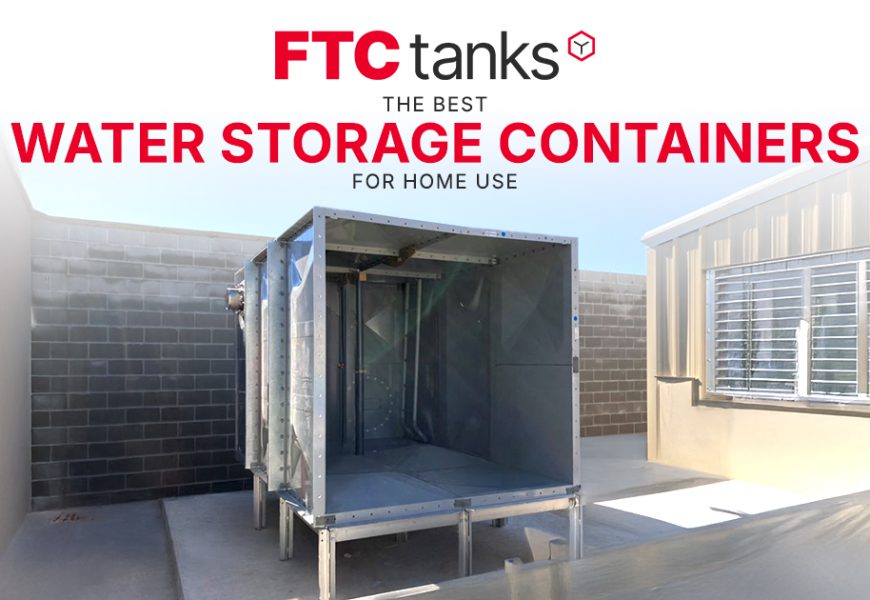Water storage is essential for both residential and industrial needs. For businesses and industries, selecting the proper water storage containers is crucial to ensure a continuous water supply, whether for operational, cooling, sanitation, or employee consumption. This article provides an in-depth look at the best water storage containers available for home use, focusing on the requirements of businesses and the variety of options available in the market. We will also discuss maintenance tips for water tanks to ensure longevity and proper functionality.
Water is one of the most fundamental resources required for daily operations in any business. Whether running a manufacturing facility, a warehouse, or a hospitality service, maintaining an adequate water supply is non-negotiable. But storing that water efficiently, safely, and economically is another matter altogether. Water storage containers come in many shapes, sizes, and materials, each designed to meet different needs, budgets, and regulatory requirements.
In this article, we will explore the best options for water storage containers, focusing on those suitable for both home and business use.
Understanding Water Storage Containers
Water storage containers come in various shapes and sizes, designed to meet specific water storage needs for homes, businesses, and industries. They hold water for various purposes, including drinking, cleaning, irrigation, or even use in industrial processes like cooling systems or power generation.
Types of Water Storage Containers:
-
Non-Plastic Water Storage Containers
Non-plastic containers are becoming increasingly popular due to environmental concerns and the quest for more durable, sustainable options. Materials like stainless steel, fiberglass, and concrete are widely used in non-plastic water storage solutions. These containers are sturdy, resistant to environmental wear and tear, and generally offer a longer lifespan than plastic options. Stainless steel water storage containers are particularly valued in industries requiring high durability and hygiene standards, such as food and beverage businesses.
-
Plastic Water Storage Containers
Plastic remains one of the most common materials used in water storage containers due to its lightweight, cost-effectiveness, and flexibility. They are widely available in various sizes, from small 5-gallon water storage containers for personal or household use to large industrial tanks for businesses. Plastic tanks are typically made from polyethene, which is resistant to corrosion and UV rays. However, companies should ensure that the plastic used is BPA-free and food-grade if the water is for consumption.
-
Food Grade Water Storage Containers
Water quality is paramount for businesses involved in food production or hospitality. Food-grade water storage containers are made from materials that do not leach harmful chemicals into the water. These containers are designed specifically for holding potable water and are usually made from BPA-free plastic or stainless steel. If you are storing drinking water or water used in food preparation, investing in food-grade containers is crucial to comply with health and safety regulations.
-
Large Water Storage Containers
Large water storage containers are typically used by businesses requiring substantial amounts of water for daily operations. These tanks can hold hundreds or even thousands of gallons of water, making them ideal for industries that need an ample, consistent water supply. They are made of various materials, such as plastic, fiberglass, and steel, and can be above-ground or underground.
Selecting the Best Water Storage Tank for Your Business
When choosing a water storage container for business purposes, several factors need to be considered. These include the container’s capacity, material, purpose, and cost. Here are some factors to keep in mind when selecting the best water storage tank for your business:
-
Capacity and Size
Selecting the right capacity is crucial for businesses that use a significant amount of water daily. A small 5-gallon water storage container may be sufficient for home use or small offices. However, more extensive operations such as factories, hotels, or warehouses require much larger tanks to meet their water needs.
Water storage tanks typically range from small, portable containers to large, stationary tanks with capacities of thousands of gallons. Estimating your water usage and choosing a container with sufficient capacity to meet your needs is essential.
-
Material Considerations
The material of your water storage container impacts both its durability and the quality of the water it holds. For industrial businesses, non-plastic containers such as stainless steel or fiberglass are often the best choices due to their resistance to wear and contamination. However, for businesses seeking a more affordable option, plastic containers still provide a good solution, provided they meet food-grade requirements if necessary.
- Stainless Steel Tanks: Durable, corrosion-resistant, and long-lasting, stainless steel is often the preferred choice for businesses that require clean, non-toxic water storage.
- Fiberglass Tanks: Resistant to corrosion and able to withstand extreme temperatures, fiberglass tanks are an excellent choice for large-scale water storage.
- Plastic Tanks: Lightweight, cost-effective, and easy to transport, plastic tanks are often used for smaller-scale applications. High-density polyethene (HDPE) plastic is the most commonly used material for larger tanks.
-
Purpose and Use
Before selecting a tank, consider the primary purpose of the water. Will it be used for drinking, cleaning, industrial processes, or irrigation? Always choose food-grade plastic or stainless steel tanks that ensure safe, uncontaminated water for drinking water. For other purposes, non-food-grade plastic containers may suffice.
-
Installation and Maintenance Requirements
Larger tanks, such as those used for commercial or industrial applications, may require professional installation, especially if they are to be placed underground or require unique plumbing connections. Maintenance is another critical factor; regular cleaning and inspections will ensure your water storage containers remain safe and functional.
Maintenance Tips for Water Tanks
Proper maintenance of your water storage containers is crucial to ensure they continue to function effectively and provide safe, clean water. Neglecting maintenance can lead to contamination, corrosion, and even system failures. Here are some essential maintenance tips for water tanks:
1. Clean the Tank Regularly
Cleaning your water storage tank regularly is essential to prevent bacteria, mold, and algae buildup. This is particularly important for plastic water storage containers, as they can be more prone to mold growth. Cleaning should be done every six months or more frequently if the water is for drinking purposes. Use a mild bleach solution to disinfect the interior of the tank and rinse it thoroughly.
2. Inspect for Leaks and Damage
Over time, water storage tanks can develop leaks or cracks. These issues are more common in plastic tanks but can also occur in other materials. Regular inspections will help you catch any problems early, preventing water wastage and ensuring your tank remains fully functional.
3. Check for Contamination
If you use your water storage containers for drinking water or food preparation, you should regularly check the water for signs of contamination. This includes testing for changes in taste appearance, which could indicate a problem with the water supply or the tank itself.
Conclusion
Selecting the proper water storage containers for home or business use is an important decision that impacts both operational efficiency and the quality of your water supply. Whether you’re looking for small 5-gallon water storage containers for personal use or large water storage tanks for industrial purposes, choosing containers made from safe, durable materials is essential. Regular maintenance of your water storage system will ensure that your tanks continue to perform optimally and provide safe water for your business.








